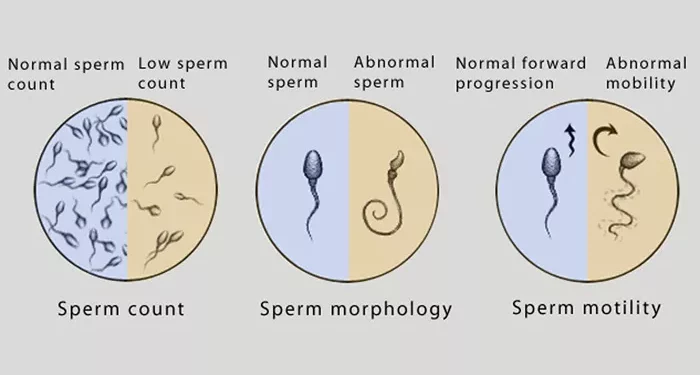Infertility is a challenging issue for many couples. While much attention often focuses on female infertility, male infertility is equally significant. Understanding the signs and underlying causes of male infertility is crucial for couples trying to conceive. This article aims to provide a comprehensive guide on how to determine if a man is infertile, using simple language and clear explanations.
Understanding Male Infertility
Male infertility refers to a man’s inability to cause pregnancy in a fertile woman after one year of regular, unprotected intercourse. It accounts for about 40-50% of all infertility cases, affecting approximately 7% of all men. The main factors influencing male infertility include sperm production, sperm function, and sperm delivery. Understanding these factors helps in diagnosing and addressing infertility issues.
Symptoms of Male Infertility
Changes in Sexual Desire and Function:
Changes in sexual desire and function can be early signs of male infertility. Reduced libido, erectile dysfunction, and difficulty ejaculating can all indicate potential fertility issues.
Pain, Swelling, or Lumps in the Testicles:
Pain, swelling, or lumps in the testicles may indicate underlying health issues affecting fertility. Conditions like varicocele, infections, or tumors can impair sperm production and function.
Recurrent Respiratory Infections:
Frequent respiratory infections can be linked to genetic conditions that also impact sperm health. For instance, cystic fibrosis is a genetic disorder that affects the respiratory system and can also lead to male infertility.
Inability to Smell:
A reduced or absent sense of smell, known as anosmia, can be associated with Kallmann syndrome. This genetic disorder affects the development of reproductive organs and can cause infertility.
Gynecomastia (Breast Growth):
Abnormal breast growth in men, known as gynecomastia, can be a sign of hormonal imbalance. Hormonal imbalances can interfere with sperm production and function.
Decreased Facial or Body Hair:
A reduction in facial or body hair can indicate a chromosomal or hormonal abnormality. Such abnormalities can affect male fertility.
Lower than Normal Sperm Count:
A lower than normal sperm count, also known as oligospermia, is a direct indicator of male infertility. Azoospermia, the complete absence of sperm in the ejaculate, is another significant sign.
Causes of Male Infertility
Varicocele:
Varicocele is a condition characterized by the swelling of the veins that drain the testicle. It is one of the most common reversible causes of male infertility. Varicoceles can reduce the quality of sperm by increasing testicular temperature.
Infections:
Infections can interfere with sperm production, sperm health, and sperm transport. These include sexually transmitted infections (STIs) like gonorrhea or HIV, and other infections like orchitis or epididymitis.
Ejaculation Issues:
Retrograde ejaculation occurs when semen enters the bladder instead of exiting through the penis during orgasm. It can result from diabetes, spinal injuries, medications, or surgery.
Antibodies that Attack Sperm:
Anti-sperm antibodies can mistakenly identify sperm as harmful invaders and attempt to eliminate them. This immune response can impair sperm function and hinder conception.
Tumors:
Cancers and nonmalignant tumors can affect the male reproductive organs directly or through the glands that release hormones related to reproduction. Surgery, radiation, or chemotherapy for treating these tumors can also impact fertility.
Undescended Testicles:
During fetal development, one or both testicles may fail to descend from the abdomen into the scrotum. This condition, known as cryptorchidism, can reduce fertility if not corrected early.
Hormone Imbalances:
Hormone imbalances can result from disorders of the testicles themselves or abnormalities affecting the hypothalamus, pituitary, adrenal, or thyroid glands. Low levels of testosterone and other hormonal imbalances can cause infertility.
Chromosome Defects:
Inherited disorders like Klinefelter syndrome, which involves an extra X chromosome, can affect male reproductive organs and fertility. Other genetic issues can also disrupt sperm production.
Problems with Sexual Intercourse:
Problems such as erectile dysfunction or premature ejaculation can hinder successful intercourse. Psychological factors, stress, and relationship issues can also play a role.
Celiac Disease:
Celiac disease, a digestive disorder caused by sensitivity to gluten, can affect fertility. Fertility typically improves with a gluten-free diet.
Certain Medications:
Some medications can impair sperm production and function. These include chemotherapy drugs, anabolic steroids, and certain antifungal and antibiotic medications.
Environmental Factors:
Exposure to environmental toxins like pesticides, radiation, and heavy metals can impair sperm production and function. Overheating the testicles, through frequent use of hot tubs or saunas, can also reduce sperm count.
Lifestyle Factors:
Unhealthy lifestyle choices such as smoking, excessive alcohol consumption, drug use, obesity, and stress can negatively affect sperm production and overall fertility.
Diagnosing Male Infertility
Medical History and Physical Examination:
A detailed medical history and physical examination are the first steps in diagnosing male infertility. The doctor will inquire about medical conditions, medications, sexual habits, and lifestyle factors.
Semen Analysis:
Semen analysis is a crucial test to assess sperm health. It evaluates sperm count, motility, morphology, and other parameters. Abnormal results may require further testing.
Hormone Testing:
Hormone testing involves measuring levels of testosterone and other hormones that regulate sperm production. Hormone imbalances can indicate underlying reproductive issues.
Genetic Testing:
Genetic testing can identify chromosomal abnormalities and genetic disorders affecting fertility. Tests like karyotyping and Y chromosome microdeletion analysis are commonly performed.
Testicular Biopsy:
A testicular biopsy involves removing a small sample of tissue from the testicle for examination. It helps determine if sperm production is normal and can identify blockages or other issues.
Imaging Tests:
Imaging tests like ultrasound or MRI can detect structural abnormalities, varicoceles, or tumors affecting the reproductive organs. Scrotal ultrasound is commonly used to evaluate the testicles and surrounding tissues.
Specialized Sperm Function Tests:
Specialized tests assess sperm function and ability to fertilize an egg. These include sperm penetration assays, acrosome reaction tests, and sperm DNA fragmentation tests.
Treatment Options for Male Infertility
Surgery:
Surgical interventions can correct varicoceles, repair obstructions, and retrieve sperm directly from the testicles or epididymis in cases of blockages or absence of sperm in the ejaculate.
Medications:
Medications can treat hormonal imbalances, infections, and other conditions affecting fertility. Hormone replacement therapy, antibiotics, and anti-inflammatory drugs are commonly used.
Assisted Reproductive Techniques (ART):
ART techniques like in vitro fertilization (IVF) and intracytoplasmic sperm injection (ICSI) can help couples achieve pregnancy. These methods involve retrieving sperm and eggs, fertilizing them in a lab, and transferring the embryo to the uterus.
Lifestyle Changes:
Adopting a healthy lifestyle can improve fertility. Quitting smoking, reducing alcohol intake, avoiding recreational drugs, maintaining a healthy weight, and managing stress are essential steps.
Counseling and Support:
Counseling and support groups can help couples cope with the emotional and psychological impact of infertility. Mental health support can also improve overall well-being and relationship dynamics.
Preventing Male Infertility
Avoid Environmental Toxins:
Minimize exposure to harmful chemicals, pesticides, and radiation. Use protective gear if working in hazardous environments.
Maintain a Healthy Lifestyle:
Adopt a balanced diet, regular exercise, and adequate sleep. Avoid smoking, excessive alcohol consumption, and drug use.
Manage Stress:
Practice stress-reduction techniques like yoga, meditation, and deep-breathing exercises. Seek professional help if experiencing chronic stress or anxiety.
Protect Against STIs:
Practice safe sex and use protection to prevent sexually transmitted infections. Get regular health check-ups and screenings.
Regular Medical Check-Ups:
Regular health check-ups can detect early signs of health issues affecting fertility. Discuss any concerns with a healthcare provider.
Avoid Overheating the Testicles:
Wear loose-fitting underwear and avoid prolonged use of hot tubs or saunas. Keep laptops and other heat-generating devices away from the lap.
When to Seek Help
Couples should seek medical help if they have been trying to conceive for over a year without success. Men experiencing symptoms of infertility, such as changes in sexual function, testicular pain, or abnormal semen analysis results, should consult a healthcare provider. Early diagnosis and treatment can improve the chances of achieving pregnancy.
Conclusion
Male infertility is a complex issue with various underlying causes and symptoms. Recognizing the signs and seeking appropriate medical evaluation is crucial for effective treatment. Advances in medical science offer numerous treatment options and assisted reproductive techniques to help couples achieve their dream of parenthood. Maintaining a healthy lifestyle, managing stress, and avoiding harmful environmental factors can also enhance fertility. By understanding and addressing male infertility, couples can navigate their journey toward conception with hope and support.
Related Links:
Can You Still Be Infertile if You Have Regular Periods?



























